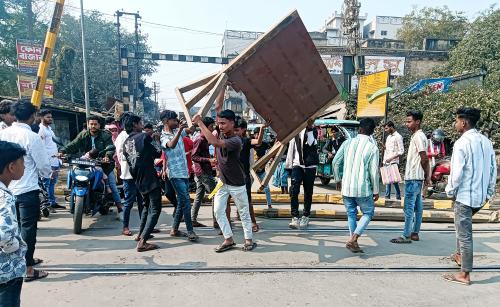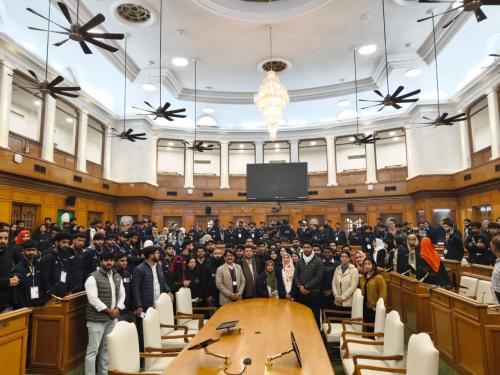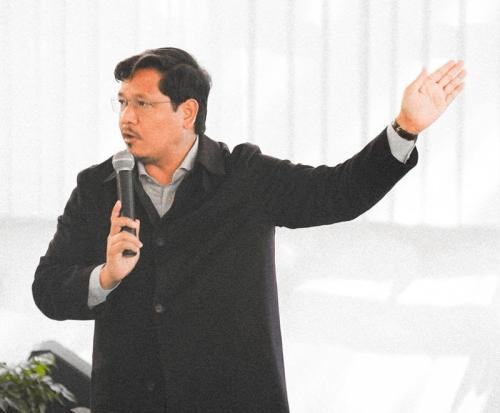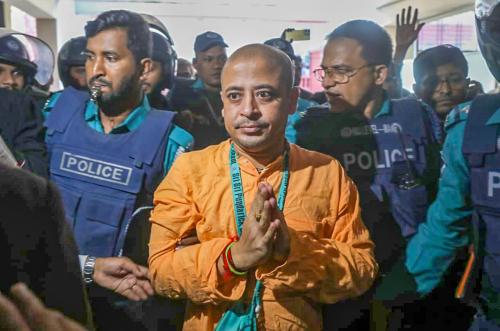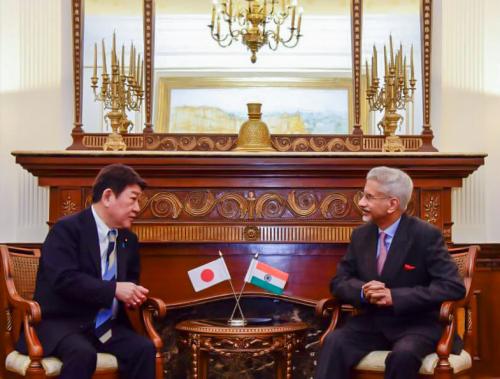New Delhi, Oct 13 (IANS) India's first Prime Minister Pandit Jawaharlal Nehru was obsessed with the princely state of Jammu & Kashmir as was Muhammad Ali Jinnah who desperately wanted to pouch it. By aligning with Nehru who propped up Sheikh Abdullah as vice president of All India States People Conference, the latter bunged in a monkey wrench in Jinnah's plan since he perceived Jinnah to be a purveyor of vile Islamist ideology. This was the great game being played on the eve of independence. Nehru was literally stopped at the gates of Kashmir Valley. Kohala, the intersection where Kashmir's territory touched British India was the place where Nehru was prevented from reaching Srinagar. Actually Nehru and one of his party were slightly injured by a sentry's bayonet in a scuffle on June 20, 1947 when cries of Go Back rent the air. As president of the All India States People's Conference, he came to the rescue of the incarcerated Sheikh Abdullah, but found himself jailed in the Uri Dak Bungalow by the repressive regime of Maharaja Hari Singh. That is how strong the bond between Nehru and Sheikh Abdullah was. On the advice of Gandhiji and Maulana Azad, Panditji agreed to return to Delhi. During further Congress top echelons confabulations, Nehru agreed to send Kriplani to Kashmir since he was too closely committed to Kashmir's cause. Pandit Ram Chandra Kak, Prime Minister of Kashmir and extremely close to British Political Agent Col. Webb, ensured Nehru was not allowed inside the Valley. With Nehru adopting a militant stance, the British Political Department didn't want him to add fuel to an already surcharged atmosphere. For Nehru, Sheikh Abdullah and Mahatma Gandhi, Kashmir was the shop window for their secularist agenda -- a Muslim majority state ruled by a minority king. Not merely a laboratory for experiment, but a test case for what India was meant to be and stand for. A confidential note prepared by Pandit Nehru's private secretary Dwarkanath Kachru on June 8, 1947 before the princely state of Jammu & Kashmir's accession to India provides an insight which stands to this day Kachru's note on Kashmir's integration went like this: "Geography, it has been suggested in certain influential quarters, will no doubt play a great part in determining the course which states would follow. Due to the proposed division of Punjab, it is therefore permissible to argue that Kashmir will find itself geographically isolated from the rest of India. Powerful influences may also develop which will tend to draw Kashmir to the new alignment of forces within areas adjacent to it. But considering the temperament and character of the people of the state and the policy and outlook of the National Conference, it can safely be assumed that under the stress of disintegrating forces, Kashmir would tend to develop progressive nationalism and a political life of its own rather than join any unhappy combination in the areas adjacent to it." Kachru's words were so prescient. The idea and ideal of Kashmir was integral to both Pandit Nehru and Sheikh Muhammad Abdullah and that remains at the very kernel of Kashmir's accession to the Union of India. Scuppering this was Muhammad Ali Jinnah who arrived in Kashmir to a hero's welcome in May 1944. His visit in response to an invite sent by Muslim Conference leaders saw him spending close to two months in the Valley. Shunned by the Ruler, his Prime Minister and Sheikh saheb, it did not stop Jinnah from making incendiary speeches. Take a look at one of them and this throws his obsession for Kashmir into stark relief: "If your objective is one, then your voice will also become one. I am a Muslim and all my sympathies are for the Muslim cause. It is better to live in a hut in Pakistan with a sense of security than to live in a bungalow in India in a shadow of security." Finally, in his address to the Muslim Conference Session in the compound of Jama Masjid, he said: "It is my duty as a Muslim to advise you correctly as to which course would be proper and ensure your success." For close to two months he canvassed across the length and breadth of the Valley, but all to no avail. Only because Sheikh Abdullah, Nehru, and ultimately Sardar Patel, thwarted his designs. Conspiracy The dramatis personae who played a part in Kashmir's accession included Acharya J.B. Kriplani who visited the Valley in May 1947. In the hurly burly of activity, this visit by Kriplani was to caution the Maharaja on the broad outlines of the Mountbatten Plan. But Kak played the spoiler, maneuvering to avoid the meeting between the two by advising His Highness to stay on in Jammu. When Kriplani insisted on a meeting with Hari Singh, Kak was forced to accompany him to Jammu. Kriplani advised Hari Singh to send its representatives to the Constituent Assembly which the Maharaja refused. Then came the June 3 plan and Mountbatten's advice to the Princes to accede to one Dominion or the other. Kak began to look still towards Jinnah and the Nawab of Bhopal who was busy playing his own games. Kak's idea was to establish independence with the tacit approval of the Muslim League and Jinnah. Then came Mountbatten's visit to Kashmir and his forthright advice about a quick decision in Kashmir's own interest. A vacillating Maharaja with Kak whispering conspiracy theories in his ear was still unsure of which way to go. Till the dramatic visit of Gandhiji when slogans of 'Mahatma Gandhi zindabad' were heard in the Valley. Kak once again tried circumventing the meeting between Gandhiji and Hari Singh. It was the Maharani who saved the situation. She wanted the Maharaja's permission to visit Gandhiji in case His Highness didn't invite him to the palace. She also wanted permission for the Yuvraj to accompany her. Since the Yuvraj wasn't feeling well, the Maharaja ultimately gave in and invited Gandhiji to the palace. It happened so suddenly that Kak remained blissfully unaware and the trio of Maharaja, Maharani and Yuvraj welcomed Gandhiji. Gandhiji went back and announced in a prayer meeting at Rawalpindi that he had advised Maharaja Hari Singh to release the NC leaders and introduce responsible government. This became the decisive turn in this fascinating Kashmir story. Yet another momentous event came when the then Home Minister Sardar Vallabhbhai Patel's asked Guru Golwalkar to convince an indecisive Maharaja to accede to India. Guruji went to Kashmir to get Maharaja Hari Singh to accede his state to the fledgling Indian Union. Guruji explained to the Dogra ruler that he better join India than entertain ideas about independence. But he chose not to. However, it was only after Kashmir came under attack from Pakistani marauders backed by its army that forced Hari Singh's hand to take the plunge. As the raiders burnt Mahura power station plunging Kashmir into darkness. Hari Singh fled to Jammu driving down in the dead of the night. When Maharaja Hari Singh, furst under the influence of Kak and then of his Rajguru Swami Sant Deo, who floated the idea of Dogristan, chased away Congress President Acharya J.B Kripalani, sent Viceroy Lord Mountbatten trout fishing and even made Gandhiji wait before seeing him, then Sardar Patel reportedly convinced RSS sarsangchalak Guru Golwalkar through MC Mahajan who been appointed PM to visit him to convince Hari Singh to accede to India. According to late Madhavrao Muley, then Prant Pracharak of Punjab and J&K, Guru Golwalkar reached Srinagar by air from Delhi on October 17, 1947. The meeting took place on the morning of October 18. During the meeting, Yuvraj Karan Singh, with his plastered fractured leg, was present while lying on the bed. Maharaja contended that 'My state is fully dependent on Pakistan. All routes pass through Sialkot and Rawalpindi. Lahore is my airport. How can I have relations with India?' Guruji made him understand by saying, 'You are a Hindu king'. By acceding to Pakistan, your Hindu subjects will have to struggle against grave difficulties. "It is correct that there is no road, rail or air link with India, but it can be set right quickly. In your interest and the interest of Jammu & Kashmir State, it is better for you to accede to India". Earlier by August 10, the differences between the Maharaja and Kak were unbridgeable and he was pensioned off, replaced by General Jankasingh. The rest is well documented and though Jinnah tried as late as October 26, 1947 to repeatedly contact Sheikh Abdullah in Prime Minister Jawaharlal Nehru's York Road residence, it was a futile exercise as VP Menon returned from Kashmir with the Maharaja's signature on the instrument of accession. Kashmir's complex and controversial birth was complete, but none of it would have happened with the spirit of Nehru, Gandhi, Abdullah and Sardar Patel. Kashmir is India and India is Kashmir and this remains a recorded fact of history, unequivocal and categorical.
The Great Game: India's tryst with Kashmir
- by Rinku
- October 13, 2022 2 minutes
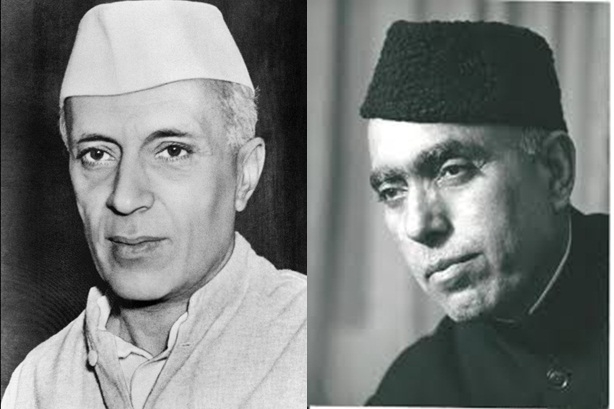
Nehru and Sheikh Abdullah



